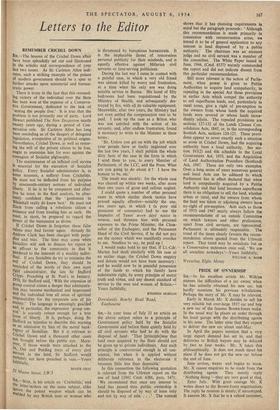Letters to the Editor
REMEMBER CRICHEL DOWN SIR, The lessons of the Crichel Down affair have been splendidly set out and illustrated the articles and correspondence of your last two issues. As Sir Carleton Allen indi- cates, such a striking example of the poison of modern government should be a spur to further attacks upon' ministerial and bureau- cratic power.
There is irony in the fact that this resound- ing victory of the individual over the State has been won at "the expense of a Conserva- tive Government, dedicated to the task of setting the people free.' It is true that the problem is not primarily one of party. Lord
Hewart published The New Despotism nearly twenty years ago, during a period of Con-
servative rule. Sir Carleton Allen has long been reminding us of the dangers of delegated legislation, irrespective of its political origins. Nevertheless, Crichel Down, as well as restor- ing the will of the private citizen to be free, ought to immunise him for ever against the contagion of Socialist philosophy. The maintenance of an inflated civil service h essential for the execution of Socialist Policy. Every Socialist administrator is, in some measure, a sufferer from Crichelitis. He must not be deflected from his purpose by nineteenth-century notions of individual
liberty. If he is to be competent and effec- tive he must, in the final analysis, be abso-
lutely confident that the gentlemen in Whitehall really do know best.' He must not flinch from calling a rebellious citizen a nuisance and from treating him as such. He must, in short, be prepared to regard the Power of the bureaucrat as divine.
If Crichel Down is forgotten these false values may find favour again. Already Sir Andrew Clark has been charged with preju- dice and bias. The time may come when $ocialists will seek to dismiss his report as an affront to the community in that it Pandered to the interests of a wealthy indivi- dual. If any Socialists do try to minimise the evil of Crichel Down, they should be reminded of the words of their own most rigid administrator, the late Sir Stafford V, riPns. Preaching at St. Paul's in January,
1950, Sir Stafford said, With the extension of group control comes a danger that administra-
tion may become mechanical and impersonal
and the individual lose all sense of spiritual responsibility for the corporate acts of his
society.' The language is amusingly guarded and, in particular, the expression group con- trol' is scarcely robust enough for a true lover of liberty. It is, perhaps, doing Sir Stafford an injustice to describe this warning as an admission by him of the moral bank- ruptcy of Socialism. But it is relevant to
Crichel Down and a thousand other cases not brought before the public eye. More- over, if those words were attached to the
In. Out and Pending trays of every civil servant in the land, Sir Stafford would certainly not have preached in vain.—Yours faithfully,
32 Moore Street, S.W.3
ROGER GRAY


































 Previous page
Previous page